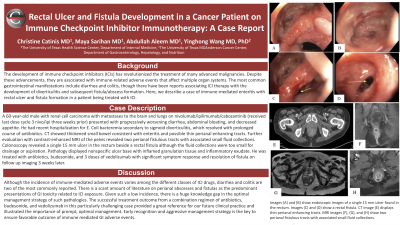Sunday Poster Session
Category: Colon
P0259 - Rectal Ulcer and Fistula Development in a Cancer Patient on Immune Checkpoint Inhibitor Immunotherapy: A Case Report
Sunday, October 22, 2023
3:30 PM - 7:00 PM PT
Location: Exhibit Hall

Has Audio

Christine Catinis, MD, MS
University of Texas Health Science Center at Houston
Houston, TX
Presenting Author(s)
Christine Catinis, MD, MS1, Maya Sarihan, MD1, Abdullah Aleem, MD2, Yinghong Wang, MD3
1University of Texas Health Science Center at Houston, Houston, TX; 2University of Texas Health Science Center, Houston, AZ; 3University of Texas MD Anderson Cancer Center, Houston, TX
Introduction: The development of immune checkpoint inhibitors (ICIs) has revolutionized the treatment of many advanced malignancies. Despite these advancements, they are associated with immune-related adverse events that affect multiple organ systems. The most common gastrointestinal manifestations include diarrhea and colitis, though there have been reports associating ICI therapy with the development of diverticulitis and subsequent fistula/abscess formation. Here, we describe a case of immune-mediated enteritis with rectal ulcer and fistula formation in a patient being treated with ICI.
Case Description/Methods: A male in 60s with renal cell carcinoma with metastases to the brain and lungs on nivolumab/ipilimumab/cabozantinib (received last dose cycle 3 nivo/ipi three weeks prior) presented with progressively worsening diarrhea, abdominal bloating, and decreased appetite. He had recent hospitalization for E. Coli bacteremia secondary to sigmoid diverticulitis, which resolved with prolonged course of antibiotics. CT showed thickened small bowel consistent with enteritis and possible thin perianal enhancing tracts. Further evaluation with contrast-enhanced MRI of the pelvis revealed two perianal fistulous tracts with associated small fluid collections. Colonoscopy revealed a single 15 mm ulcer in the rectum beside a rectal fistula although the fluid collections were too small for drainage or aspiration. Pathology displayed nonspecific ulcer base with inflamed granulation tissue and inflammatory exudate. He was treated with antibiotics, budesonide, and 3 doses of vedolizumab with significant symptom response and resolution of fistula on follow up imaging 3 weeks later.
Discussion: Although the incidence of immune-mediated adverse events varies among the different classes of ICI drugs, diarrhea and colitis are two of the most commonly reported. There is a scant amount of literature on perianal abscesses and fistulas as the predominant presentations of GI toxicity related to ICI exposure. Given such a low incidence, there is a huge knowledge gap in the optimal management strategy of such pathologies. The successful treatment outcome from a combination regimen of antibiotics, budesonide, and vedolizumab in this particularly challenging case provided a great reference for our future clinical practice and illustrated the importance of prompt, optimal management. Early recognition and aggressive management strategy is the key to ensure favorable outcome of immune mediated GI adverse events.

Disclosures:
Christine Catinis, MD, MS1, Maya Sarihan, MD1, Abdullah Aleem, MD2, Yinghong Wang, MD3. P0259 - Rectal Ulcer and Fistula Development in a Cancer Patient on Immune Checkpoint Inhibitor Immunotherapy: A Case Report, ACG 2023 Annual Scientific Meeting Abstracts. Vancouver, BC, Canada: American College of Gastroenterology.
1University of Texas Health Science Center at Houston, Houston, TX; 2University of Texas Health Science Center, Houston, AZ; 3University of Texas MD Anderson Cancer Center, Houston, TX
Introduction: The development of immune checkpoint inhibitors (ICIs) has revolutionized the treatment of many advanced malignancies. Despite these advancements, they are associated with immune-related adverse events that affect multiple organ systems. The most common gastrointestinal manifestations include diarrhea and colitis, though there have been reports associating ICI therapy with the development of diverticulitis and subsequent fistula/abscess formation. Here, we describe a case of immune-mediated enteritis with rectal ulcer and fistula formation in a patient being treated with ICI.
Case Description/Methods: A male in 60s with renal cell carcinoma with metastases to the brain and lungs on nivolumab/ipilimumab/cabozantinib (received last dose cycle 3 nivo/ipi three weeks prior) presented with progressively worsening diarrhea, abdominal bloating, and decreased appetite. He had recent hospitalization for E. Coli bacteremia secondary to sigmoid diverticulitis, which resolved with prolonged course of antibiotics. CT showed thickened small bowel consistent with enteritis and possible thin perianal enhancing tracts. Further evaluation with contrast-enhanced MRI of the pelvis revealed two perianal fistulous tracts with associated small fluid collections. Colonoscopy revealed a single 15 mm ulcer in the rectum beside a rectal fistula although the fluid collections were too small for drainage or aspiration. Pathology displayed nonspecific ulcer base with inflamed granulation tissue and inflammatory exudate. He was treated with antibiotics, budesonide, and 3 doses of vedolizumab with significant symptom response and resolution of fistula on follow up imaging 3 weeks later.
Discussion: Although the incidence of immune-mediated adverse events varies among the different classes of ICI drugs, diarrhea and colitis are two of the most commonly reported. There is a scant amount of literature on perianal abscesses and fistulas as the predominant presentations of GI toxicity related to ICI exposure. Given such a low incidence, there is a huge knowledge gap in the optimal management strategy of such pathologies. The successful treatment outcome from a combination regimen of antibiotics, budesonide, and vedolizumab in this particularly challenging case provided a great reference for our future clinical practice and illustrated the importance of prompt, optimal management. Early recognition and aggressive management strategy is the key to ensure favorable outcome of immune mediated GI adverse events.

Figure: Images (A) and (B) show endoscopic images of a single 15 mm ulcer found in the rectum. Images (C) and (D) show a rectal fistula. CT image (E) displays thin perianal enhancing tracts. MRI images (F), (G), and (H) show two perianal fistulous tracts with associated small fluid collections.
Disclosures:
Christine Catinis indicated no relevant financial relationships.
Maya Sarihan indicated no relevant financial relationships.
Abdullah Aleem indicated no relevant financial relationships.
Yinghong Wang: ilyapharma – Consultant. IOTA – Consultant. Janssen – Consultant. MabQuest – Advisory Committee/Board Member. Sorriso – Consultant. Tillotts – Consultant.
Christine Catinis, MD, MS1, Maya Sarihan, MD1, Abdullah Aleem, MD2, Yinghong Wang, MD3. P0259 - Rectal Ulcer and Fistula Development in a Cancer Patient on Immune Checkpoint Inhibitor Immunotherapy: A Case Report, ACG 2023 Annual Scientific Meeting Abstracts. Vancouver, BC, Canada: American College of Gastroenterology.
